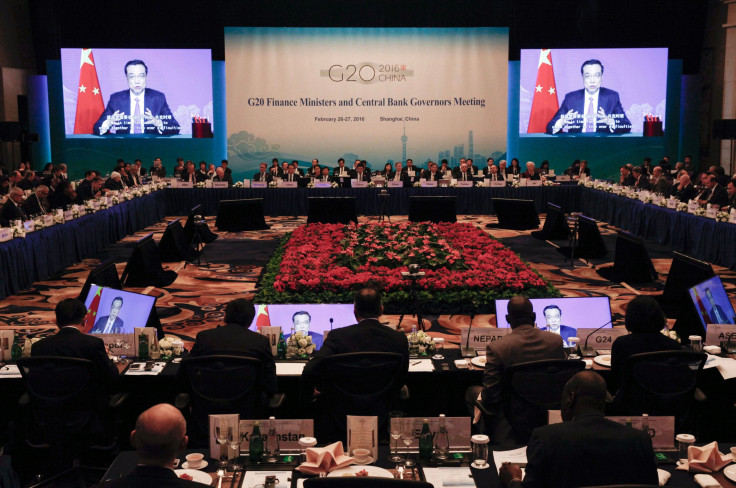G20 Draft Communique Reflects Concerns Over Brexit, Refugee Crisis

A draft communique of the Group of 20 (G-20) members showed that a potential exit of Britain from the European Union, known as Brexit, and the growing refugee crisis in Europe were additional topics of concern, according to reports. Central bankers and finance ministers from advanced and growing economies are meeting in Shanghai to decide on a final communique at the end of the session later Saturday.
The draft communique, which was seen by Bloomberg, had the members from G-20 agree to use monetary, fiscal and structural tools to increase growth and “calibrate and clearly communicate” their policies regarding it. The draft also accentuated limitations over a central bank-led stimulus, saying that “monetary policy alone cannot lead to balanced growth.” The financial heads also agreed to “consult closely” on foreign exchange markets and warned that too much of volatility can hurt financial and economic stability. The communique showed G-20 members promising to improve capital flows to zero in on potential risks sooner, and reiterated former pledges to abstain from making competitive devaluations.
“It doesn’t seem the meeting offers concrete, deliverable or coherent solutions to boost growth,” Raymond Yeung, senior economist at Australia & New Zealand Banking Group Ltd. in Hong Kong, told Bloomberg, adding: “I doubt whether it will have a meaningful impact on the market in the near term.”
According to a report by Reuters, which also saw the draft of the communique, the document mentioned the risk of a potential “U.K. exit from the European Union” and how it would affect the world economy. However, the members also feel that the recent turbulence in the markets may have caused overreactions.
“While recognizing these challenges, we nevertheless judge that the magnitude of recent market volatility has not reflected the underlying fundamentals of the global economy,” the draft document said, according to Reuters.
“We expect activity to continue to expand at a moderate pace in most advanced economies, and growth in key emerging market economies remains strong,” the document read, according to Bloomberg, adding: “The global recovery continues, but it remains uneven and falls short of our ambition for strong, sustainable and balanced growth.”
U.K. Prime Minister David Cameron is expected to welcome the warning from the G-20 communique over Brexit, as he is trying to convince his administration and the opposition that the country should remain with the EU. The U.K.'s Chancellor of the Exchequer George Osborne said, according to the Guardian, that growing problems in the world economy may in turn affect the British economy.
“The storm clouds are clearly gathering in the world economy and that has a consequence for lots of countries including Britain. Now we are weathering it better than most, but we’ve just had confirmation that our own economy is not as big as we had hoped,” Osborne said, according to the Guardian, adding: “So we may need to undertake further reductions in spending because this country can only afford what it can afford and we will address that in the budget, because I’m absolutely clear we’ve got to root our country in the principle that we must live within our means and we have economic security.”
Key risks in terms of world economy also included increased geopolitical tensions, a drastic fall in commodity process and changing capital flows, according to the draft communique.
The Bloomberg report added that China’s economic direction was not mentioned in the communique, but Beijing has managed to achieve some of the pre-summit targets. The draft also stated that officials would support further examination of the Special Drawing Rights, the supplementary foreign exchange reserve assets that are defined and maintained by the International Monetary Fund (IMF). China’s currency yuan is set to be included in the IMF’s list of reserve currencies this year.
Beijing said it would not devalue the yuan further after lowering its exchange rate last August, Reuters reported. However, there were concerns about some members wanting a quick fix to domestic woes through a weaker currency. Late on Friday, Japanese finance minister Taro Aso urged China to conduct a currency reform and plan out a mid-term structural reform plan along with a timeline. U.S. Treasury Secretary Jack Lew also urged Beijing to move to a more market-oriented exchange rate in an “orderly way" and “refrain from policies that would be destabilizing and create an unfair advantage.”
© Copyright IBTimes 2024. All rights reserved.






















